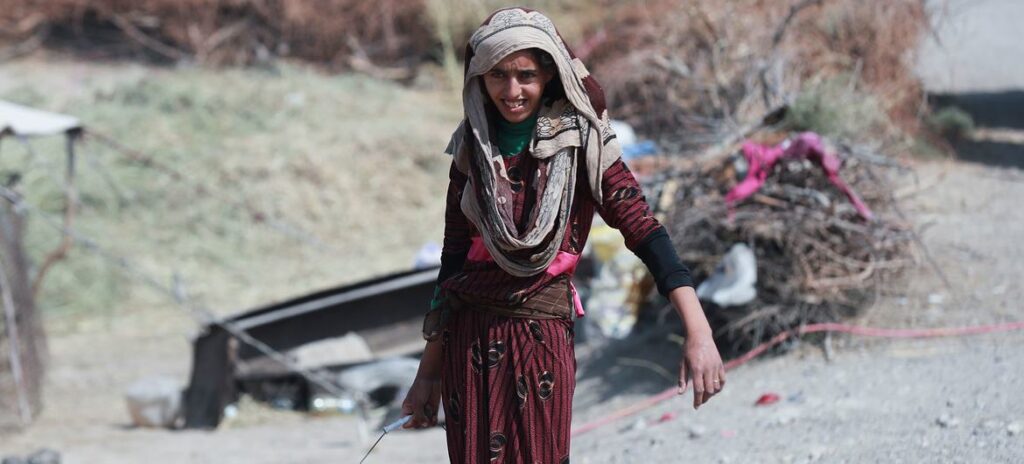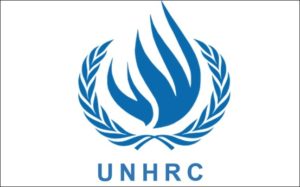UN Expert Calls for Lifting Unilateral Sanctions ‘Suffocating’ Syrian People
UNITED NATIONS, 14 Nov 2022
UN High Commissioner for Human Rights - TRANSCEND Media Service

Souleiman A young girl living in an informal settlement in Raqqa city, northeast Syria.
UNICEF/Delil.
10 Nov 2022 – UN Special Rapporteur on unilateral coercive measures and human rights Alena Douhan today urged sanctioning States to lift unilateral sanctions against Syria, warning that they were perpetuating and exacerbating the destruction and trauma suffered by the Syrian people since 2011.
“I am struck by the pervasiveness of the human rights and humanitarian impact of the unilateral coercive measures imposed on Syria and the total economic and financial isolation of a country whose people are struggling to rebuild a life with dignity, following the decade-long war,” Douhan said.
In a statement following her 12-day visit to Syria, the Special Rapporteur presented detailed information about the catastrophic effects of unilateral sanctions across all walks of life in the country.
Douhan said 90 per cent of Syria’s population was currently living below the poverty line, with limited access to food, water, electricity, shelter, cooking and heating fuel, transportation and healthcare and warned that the country was facing a massive brain-drain due to growing economic hardship.
“With more than half of the vital infrastructure either completely destroyed or severely damaged, the imposition of unilateral sanctions on key economic sectors, including oil, gas, electricity, trade, construction and engineering have quashed national income, and undermine efforts towards economic recovery and reconstruction.
The expert said blocking of payments and refusal of deliveries by foreign producers and banks, coupled with sanctions-induced limited foreign currency reserves have caused serious shortages in medicines and specialised medical equipment, particularly for chronic and rare diseases. She warned that rehabilitation and development of water distribution networks for drinking and irrigation had stalled due to the unavailability of equipment and spare parts, creating serious public health and food security implications.
“In the current dramatic and still-deteriorating humanitarian situation as 12 million Syrians grapple with food insecurity, I urge the immediate lifting of all unilateral sanctions that severely harm human rights and prevent any efforts for early recovery, rebuilding and reconstruction,” Douhan said.
“No reference to good objectives of unilateral sanctions justifies the violation of fundamental human rights. The international community has an obligation of solidarity and assistance to the Syrian people.”
The Special Rapporteur also dealt with other issues showcasing the multifaceted negative impact of sanctions, including international cooperation in the areas of science, arts, sports, preservation of national cultural heritage and restitution of cultural artifacts, access to new technologies, cyberspace and online information platforms, criminality and regional/international security, as well as the issue of frozen foreign assets of Syrian financial institutions and other entities.
“I urge the international community and the sanctioning states in particular, to pay heed to the devastating effects of sanctions and to take prompt and concrete steps to address over-compliance by businesses and banks in accordance with international human right law,” she said.
“In the words of one of my interlocutors, echoing numerous others: ‘I saw much suffering, but now I see the hope die,’” Douhan said.
During her visit the UN expert met representatives from national and local government institutions, non-governmental organisations, associations, humanitarian actors, businesses, UN entities, academia, religious leaders and faith-based organisations, as well as the diplomatic community. In addition to the capital Damascus, she also visited Homs city, rural Homs, and rural Damascus.
The Special Rapporteur will present a report to the Human Rights Council in September 2023.
***********************************************
Ms Alena Douhan (Belarus) was appointed as Special Rapporteur on the negative impact of the unilateral coercive measures on the enjoyment of human rights by the Human Rights Council in March 2020. Ms. Douhan has extensive experience in the fields of international law and human rights as, a professor of international law at the Belarusian State University (Minsk), a visiting Professor at the Institute for International Law of Peace and Armed conflict, (Bochum, Germany) and the Director of the Peace Research Centre (Minsk). She received her PhD at the Belarusian State University in 2005 and obtained Dr. hab. in International Law and European Law in 2015 (Belarus).
Ms. Douhan’s academic and research interests are in the fields of international law, sanctions and human rights law, international security law, law of international organizations, international dispute settlement, and international environmental law.
Special Rapporteurs are part of what is known as the Special Procedures of the Human Rights Council. Special Procedures, the largest body of independent experts in the UN Human Rights system, is the general name of the Council’s independent fact-finding and monitoring mechanisms that address either specific country situations or thematic issues in all parts of the world. Special Procedures’ experts work on a voluntary basis; they are not UN staff and do not receive a salary for their work. They are independent from any government or organization and serve in their individual capacity.
Tags: European Union, Invasion, Middle East, NATO, Occupation, Pentagon, Sanctions, Syria, USA, United Nations
DISCLAIMER: The statements, views and opinions expressed in pieces republished here are solely those of the authors and do not necessarily represent those of TMS. In accordance with title 17 U.S.C. section 107, this material is distributed without profit to those who have expressed a prior interest in receiving the included information for research and educational purposes. TMS has no affiliation whatsoever with the originator of this article nor is TMS endorsed or sponsored by the originator. “GO TO ORIGINAL” links are provided as a convenience to our readers and allow for verification of authenticity. However, as originating pages are often updated by their originating host sites, the versions posted may not match the versions our readers view when clicking the “GO TO ORIGINAL” links. This site contains copyrighted material the use of which has not always been specifically authorized by the copyright owner. We are making such material available in our efforts to advance understanding of environmental, political, human rights, economic, democracy, scientific, and social justice issues, etc. We believe this constitutes a ‘fair use’ of any such copyrighted material as provided for in section 107 of the US Copyright Law. In accordance with Title 17 U.S.C. Section 107, the material on this site is distributed without profit to those who have expressed a prior interest in receiving the included information for research and educational purposes. For more information go to: http://www.law.cornell.edu/uscode/17/107.shtml. If you wish to use copyrighted material from this site for purposes of your own that go beyond ‘fair use’, you must obtain permission from the copyright owner.
